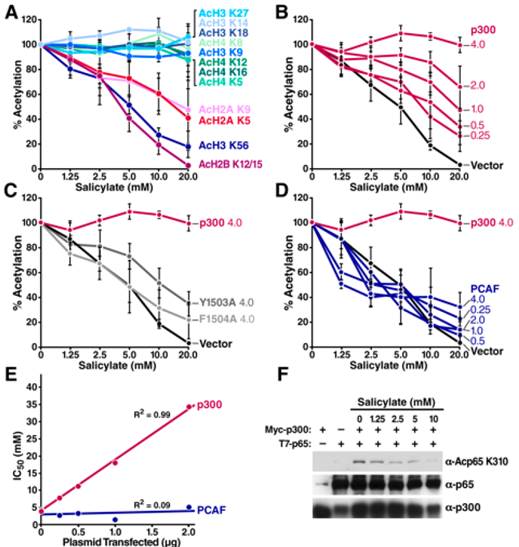古老的抗炎药水杨酸具有抗癌特性
来源:eLife
作者:Kotaro Shirakawa等
时间:2016-06-06

最近,来自美国Gladstone研究所的科学家们发现,水杨酸——在非类固醇抗炎药阿司匹林和二氟尼柳中的一种关键化合物,可通过一条新的途径来停止炎症和癌症。相关研究结果发表在5月31日的《eLife》杂志上。
在这项研究中,研究人员发现,水杨酸和二氟尼柳可抑制两个有助于控制体内基因表达的关键蛋白质。这两个蛋白质p300和CREB结合蛋白(CBP),是控制某些引发癌症或参与细胞生长的蛋白质水平的表观遗传学调节因子。通过抑制p300和CBP,水杨酸和二氟尼柳可阻断这些蛋白质的激活,并阻止炎症引起的细胞损伤。这项研究提供了第一个确凿的证据表明,p300和CBP可以通过药物靶定,并可能具有重要的临床学意义。
本文资深作者、Gladstone病毒学和免疫学研究所副主任Eric Verdin博士说:“水杨酸是地球上最古老的药物之一,可以追溯到古埃及和希腊时代,但我们仍然发现了关于它新的一面。揭开水杨酸起作用的这一炎症途径,为这些药物打开了许多新的临床可能性。”
早期研究是在本文共同作者、迈阿密大学Miller医学院综合癌症中心主任Stephen D. Nimer博士的实验室进行的,他们在P300和促白血病蛋白AML1-ETO之间建立了一种联系。在目前的研究中,Gladstone和Sylvester的特科学家一起测试,用二氟尼柳抑制P300是否能够抑制小鼠白血病细胞的生长。据预测,二氟尼柳可停止肿瘤进展,并使小鼠白血病模型的肿瘤收缩。
最近,美国斯克里普斯研究所(TSRI)佛罗里达校区的科学家发现,一种最广泛使用的止痛、抗炎药物——塞来昔布,可在动物模型中减缓一种特殊肿瘤的增长速度,并指出这种药物可能对其他类型的肿瘤也有相同的作用。这项新研究在《Cancer Research》杂志。
此外,也有科学家们相继发现,糖尿病药物、骨质疏松治疗药物、抗抑郁药物等等,都具有抗癌特性。相关阅读:糖尿病药物二甲双胍如何抑癌;两篇PNAS文章:老药新用,显示抗癌大威力;四川大学Nature子刊:老药新用,治疗癌症。(来源:生物通 王英)
Salicylate, diflunisal and their metabolites inhibit CBP/p300 and exhibit anticancer activity
Abstract Salicylate and acetylsalicylic acid are potent and widely used anti-inflammatory drugs. They are thought to exert their therapeutic effects through multiple mechanisms, including the inhibition of cyclo-oxygenases, modulation of NF-κB activity, and direct activation of AMPK. However, the full spectrum of their activities is incompletely understood. Here we show that salicylate specifically inhibits CBP and p300 lysine acetyltransferase activity in vitro by direct competition with acetyl-Coenzyme A at the catalytic site. We used a chemical structure-similarity search to identify another anti-inflammatory drug, diflunisal, that inhibits p300 more potently than salicylate. At concentrations attainable in human plasma after oral administration, both salicylate and diflunisal blocked the acetylation of lysine residues on histone and non-histone proteins in cells. Finally, we found that diflunisal suppressed the growth of p300-dependent leukemia cell lines expressing AML1-ETO fusion protein in vitro and in vivo. These results highlight a novel epigenetic regulatory mechanism of action for salicylate and derivative drugs.
原文链接:https://elifesciences.org/content/5/e11156




